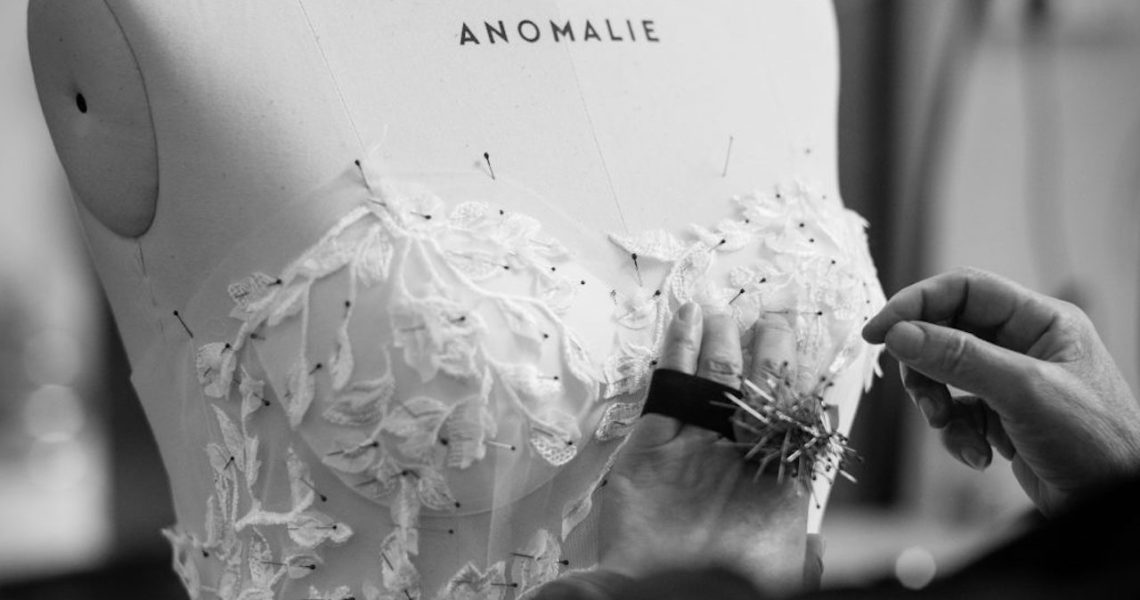With retailers closed across the U.S., many brides with late 2020 or early 2021 wedding dates are turning their attention to a category not typically considered when it comes to buying a wedding dress: Direct-to-consumer.
As 90% of wedding dress shopping still happened through brick-and-mortar, pre-coronavirus, a huge chunk of the $2.4 billion U.S. bridal industry is at a standstill. Ninety percent of all gowns sold in the U.S. are also produced in China, where lockdowns and quarantine have been in effect for the past 10-plus weeks in certain parts of the country. But not all wedding dress companies are suffering right now. Anomalie, a DTC custom wedding dress brand with over 4 billion dress options, is seeing an uptick in sales week-over-week and an increase in customer interest, with more people sitting at home and unable to visit bridal boutiques to try-on dresses.
In the last month, the company has seen a 25% increase in sign-ups to take the brand’s AI-powered design survey and begin creating a custom dress, despite many brides being forced to postpone or even cancel their weddings. Average weekly sales are three-times greater than they were six months ago and that has been with a decrease in marketing spend, said Leslie Voorhees Means, co-founder and CEO of Anomalie. She declined to share the specifics around how much marketing spend has been cut.
“We have a minimum six- to seven-month timeline to produce a gown, so brides are coming into the top of the funnel that have weddings late in 2020 and 2021. My gut is that people are optimistic that this is going to resolve itself by the end of the year, and definitely by next year,” she said.
With marketing spend down, the company is relying on organic social posts across Instagram and Facebook. The brand is hosting weekly Instagram Live sessions with Voorhees Means, where she answers any customer questions about the impact coronavirus is having on the bridal industry and Anomalie, plus it’s posting regular video updates about guaranteed delivery for brides.
Luckily for the brand, there has been little to no disruption in its supply chain over the last two months, which Voorhees Means attributed to the company’s digitally native business model. The setup has put Anomalie ahead of large bridal companies like David’s Bridal and smaller boutiques that rely on in-store experiences to drive sales.
Since launching in Dec. 2018, the company has raised over $20 million in venture capital with the goal of helping brides create the perfect dress through a remote model. The brand had already paired brides with stylists over the phone to help with any questions or concerns during the design process, and it recently added a Zoom conferencing option for customers.
“Bridal has had a traditional in-store sales method, and for good reason. It’s an experience and an important moment. Bridal companies need to, and some are, finding a better way to do digital commerce,” said Sarah Willersdorf, global head of luxury for Boston Consulting Group.
Anomalie has three factory partners, all throughout China, but none in or near Wuhan, the epicenter of the outbreak in China. Today, all three factories are up and running, sending thousands of videos and pictures back-and-forth to U.S. headquarters to update the team on production. Voorhees Means said the company did briefly halt production when its partners closed down for Chinese New Year.
“We planned for zero output during the holiday with a slow ramp down and ramp up. We opened just one week later but didn’t see any impact to our timeline, just because it was something we factor in for that time of year anyway,” said Voorhees Means.




